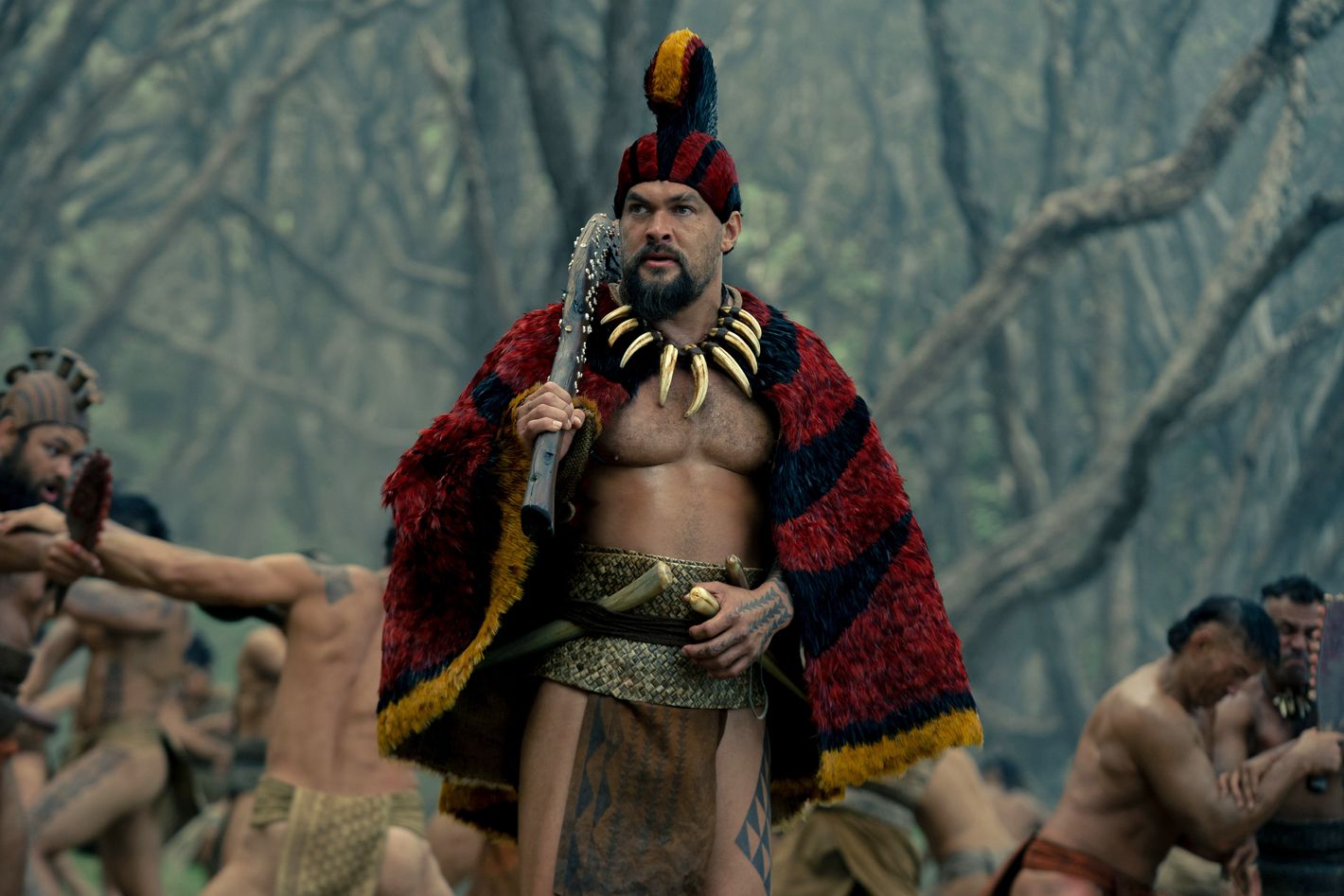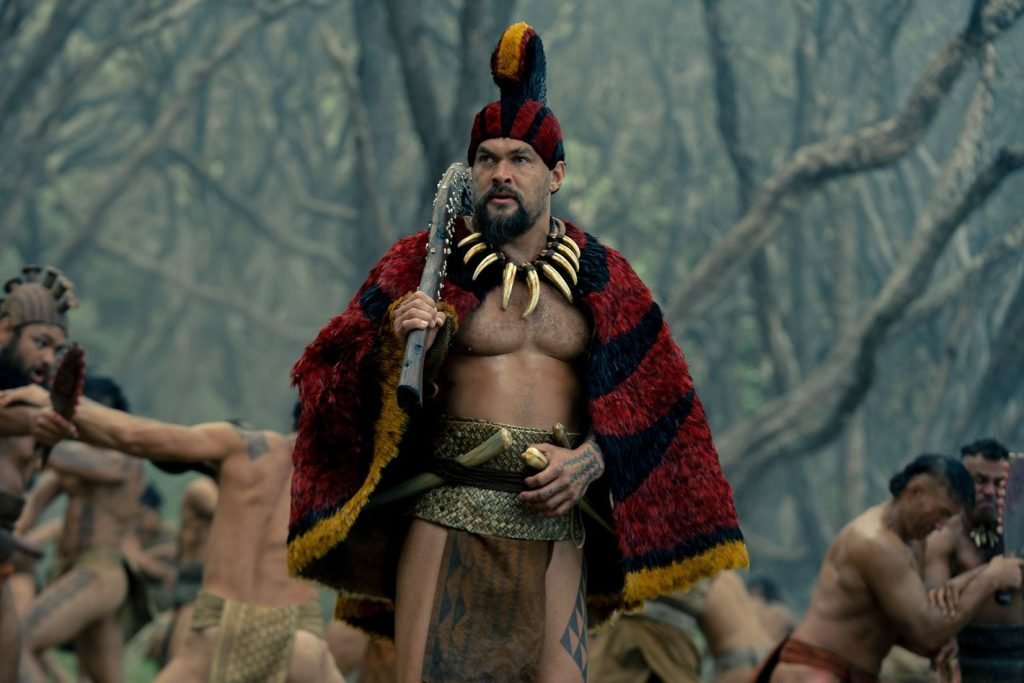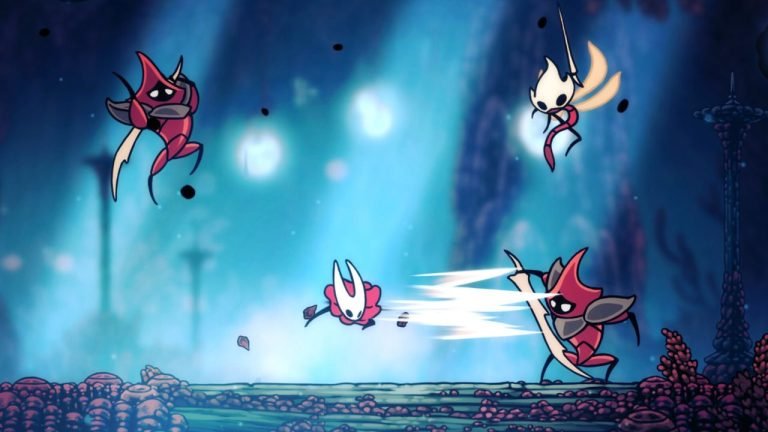
Chief of War begins with Jason Momoa wrestling a shark and ends with him melting a guy’s face in a river of lava. What more could you want from a television show?
The new Apple TV+ series starring and co-created, written, and directed by Momoa is a perfect medium for his particular gifts — that brawn, that smirk, that ability to subvert expectations by moving easily from rage and disgust to tenderness and virtue. As Hawaiian royal and famed warrior Kaʻiana, Momoa is playing an amalgamation of recognizable Aquaman–Khal Drogo–Duncan Idaho traits in a series that fashions itself after epics like Game of Thrones with feuding factions and fantastical gods. But this is the fullest performance we’ve gotten from Momoa yet, one that drives him to his physical limit (so much running around in a tiny loincloth and thong!) and to emotional highs and lows of acrimony and uncertainty at the center of this story about infighting 18th-century Hawaiian kingdoms facing off against foreign colonizers. And while the nine-episode first season of Chief of War often feels like a Hawaiian-history lesson fed through a Troma filter, the series has more on its mind than just bloodshed. It’s grappling with questions about colonialism, capitalism, faith, fate, and identity, and all its probing makes for a show that is simultaneously rowdy and contemplative. Michael Mann–style shots of characters considering their lives while staring into the middle distance at crashing waves or steaming fields of lava are beautiful and plentiful.
In fact, watching Chief of War is a bit like going to the beach. You think you’re just hanging out in the sun and enjoying the waves but then you go home and keep finding sand in places you didn’t expect. The series’ impressively brutal action sequences are the fun stuff, but questions about the validity of a monarchy and the intrusions of the outside world on an insular culture are what stick with you. Some people may be annoyed by this. But for those who want a little bit of rumination with their raucousness, Chief of War provides a nice balance. In that way, it evokes Shōgun, the last buzzy and big-budget series to reclaim a country’s history by rejecting a foreign lens. But it would be too simplistic to say Chief of War is the new Shōgun just because both of them happen to center nonwhite actors. Instead, it’s kind of an inverse of that series’ perspective on nationalism versus globalization, a different take on whether it’s resourceful to open your society to outsiders on your own terms or noble to close borders and reject alien ideologies and practices. And should I mention Momoa’s little loincloth again? It’s doing holy work.
Momoa’s primary creative partner in Chief of War (which premieres August 1 with two episodes) is Thomas Pa‘a Sibbett, whose previous three writing credits (2018’s Braven, 2022’s The Last Manhunt, and 2023’s Aquaman and the Lost Kingdom) all starred the actor. The two are “direct descendants of characters in this series,” an Apple TV+ letter to critics says, and their shared Hawaiian heritage is the Chief of War’s North Star. It guides the series’ Indigenous perspective, the cultural practices shown onscreen, and the belief systems that shape Kaʻiana’s and his family’s actions. When the series begins, they’re outcasts from Maui, where Kaʻiana was a royal and a “chief of war,” or the general of Chief Kahekili (Temuera Morrison, who portrayed Momoa’s father in the Aquaman films and now plays an uncle turned enemy). Three years before, Kaʻiana gave up his and his family’s revered status when he decided that Chief Kahekili had grown too bloodthirsty. But Kahekili tries to get Kaʻiana back on his side to help him invade O’ahu, and that instigating incident kicks off a complicated and sprawling narrative. The season jumps between the four Hawaiian islands and travels to Alaska and the Spanish Indies once Kaʻiana is unintentionally taken away from his home by British sailors. It features dozens of characters with often conflicting motivations and involves a prophecy that is supposed to identify a “great king” who will end the islands’ cyclical warfare. It would be too cumbersome to describe all those subplots and relationships here. But Chief of War cares about them all, devoting significant amounts of time to table-setting the islands and tracing how their geographies led to different faiths, rituals, alliances, and enmities (which really makes you realize how much James Cameron just copied all aspects of Polynesian culture for his Avatar franchise).
Most important are three loosely historical story lines that intersect over the season. Kaʻiana vows to kill Kahekili, a promise that leads to him embracing foreign weaponry in order to unite the islands against him. He makes a powerful ally in Kaʻahumanu (Luciane Buchanan), the clever and ambitious wife of warrior and farmer Kamehameha (Kaina Makua), who some believe is the islands’ long-prophesied ruler. Yet Kamehameha has his own rival in the form of his cousin Keōua (a lights-out fantastic Cliff Curtis), who wants to rule alone. At one point, as a gesture of rage and grief, Keōua punches himself in the face until he pulls out his own teeth; later on, he makes another guy do the same to prove his loyalty, lazily holding his hand out for the man to spit blood into. Curtis is having a great time! Hanging over all this is a real sense of Momoa and Pa‘a Sibbett looking analytically at the past and drawing conclusions that veer between celebratory and conservative, and the series is most interesting in those moments of internal tension.
Shōgun was precise in its presentation of samurai-era Japan as an honorable, regimented, complicated place that did not need European culture, Christianity, or British naval canons to achieve peace. It had an (arguably biased) ideological purity that made the show immeasurably immersive. But Chief of War isn’t so strictly closed-borders, and its thoughts on the past are not nearly as declarative. Its characters constantly argue about how much of the outside world they want to allow in. Would guns help Hawaii’s people rise up against despot rulers like Kahekili and Keōua, or would widespread use of the weapon only cause more preventable carnage? Would implementing a money system, or harvesting the islands’ sandalwood forests to trade globally, be a step forward for Hawaiian independence or a shattering betrayal of the islands’ communal and collective nature? Would the Hawaiian characters learning the English language and British customs expand their knowledge or pull them away from their identities? (It’s a question complicated by Chief of War’s own pattern of having its characters speak English in ceremonial Hawaiian situations instead of using subtitles; if doing so is for our benefit, I wish they hadn’t.) Yet how the series engages with the question of whether foreign culture was ultimately beneficial or harmful to Hawaii makes for a fascinatingly turbulent watch, even as the series struggles with balancing and pacing so many narrative threads.
Mapping modern politics on these characters feels a little goofy, even as I’m convinced scenes of a Black man who escaped slavery teaching Kaʻiana’s allies how to use guns will drive gun-rights advocates on either side of the right-left line into very different tizzies. But Momoa’s Kaʻiana is such a fascinating central figure because meeting people outside of his community causes him to develop a somewhat contradictory set of reactionary positions. To his brothers’ confusion, he swaps his loincloth for pants after spending time with “paleskins.” (Nahi’s genuinely aghast penis joke — “How do the women know the big fish from the little ones?” — may be the season’s funniest moment.) In an about-face turn from Kaʻiana’s previously nonviolent ways, he advocates for rifles in a story line that comes dangerously close to “the only thing to stop a bad guy with a gun is a good guy with a gun” territory but is also a provocative concept of autonomy in a historical context. When Kaʻiana says, “I’ve seen things that I could never dream of. Things that our gods could not explain,” Momoa plays the Roy Batty–like moment with such regret, loathing, and rawness that you understand the extent to which Kaʻiana’s sense of self has changed. Momoa’s performance gives Kaʻiana’s struggle to accept how disconnected the broader world is from his understanding of justness and goodness, and Chief of War’s own internal indecision about that, real pathos. All that and Momoa wrestling a shark and melting a guy’s head in a volcano. That’s range.


